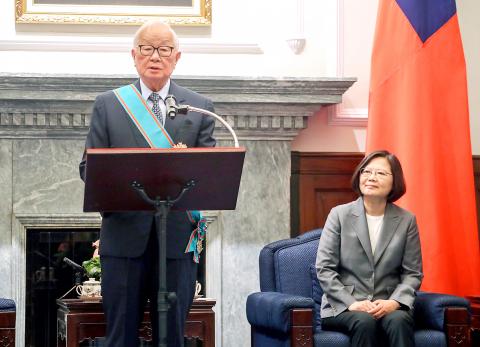President Tsai Ing-wen (蔡英文) yesterday awarded Taiwan Semiconductor Manufacturing Co (TSMC) founder Morris Chang (張忠謀) the Order of Propitious Clouds, First Class.
At the ceremony, Tsai said the medal was for the tech guru’s contribution to Taiwan’s IC industry, as well as the development of the local high-tech sector.
The Order of Propitious Clouds is awarded to civil servants who have made great contributions to the nation and to civilians and foreigners for outstanding civic merit.

Photo: CNA
Chang is the first person from the business sector to receive the Order of Propitious Clouds, First Class.
Tsai said she greatly respected Chang and considered him a good friend, adding that she often asks him for advice on how to promote national policies and has learned a lot from the TSMC founder.
Chang brought advanced IC know-how to Taiwan from the US, where he received a master’s degree from the Massachusetts Institute of Technology and a doctorate from Stanford University, helping Taiwan build a comprehensive IC industry incorporating upstream and downstream sectors, she said.
In 1985, the government recruited Chang to run the Industrial Technology Research Institute, a decision that perhaps altered the course of science and technology in Taiwan forever, Tsai said.
As head of the institute, Chang was in charge of promoting industrial and technological development in Taiwan. He combined his experience working in the semiconductor industry with a rising trend of outsourcing to found TSMC.
Since its establishment in 1987, TSMC has become the world’s leading semiconductor foundry, commanding a global market share of more than 50 percent.
TSMC has continued to developed critical IC technology in Taiwan, Tsai said, a reference to the company’s plan to build a sophisticated 3-nanometer process wafer fab in Tainan, which is expected to serve as a hub to supply chips for cloud-computing and artificial intelligence applications, as well as 5G devices.
Addressing the ceremony, Chang, who in June retired as chairman of TSMC after serving with the company for more than 30 years, said the world’s largest contract chipmaker is a very successful company, but it also faces stiff competition from firms in several countries such as the US, China and Japan, which have been motivated by rising nationalism.
Amid escalating statism, TSMC needs fair competition in order to grow, he said.
In addition to international competition, the local IC industry also faces a shortage of resources, including land, water, electricity and talent, Chang said, urging the government to give the tech sector the support it needs to prosper.
Chang said he has faith in TSMC’s new leadership and expects the company to expand and make more contributions to the nation.
In June, Mark Liu (劉德音) succeeded Chang as chairman of the company’s board and C.C. Wei (魏哲家) has served as TSMC’s vice chairman and CEO, establishing a dual leadership system.

A decision to describe a Chinese Ministry of Foreign Affairs statement on Singapore’s Taiwan policy as “erroneous” was made because the city-state has its own “one China policy” and has not followed Beijing’s “one China principle,” Deputy Minister of Foreign Affairs Tien Chung-kwang (田中光) said yesterday. It has been a longstanding practice for the People’s Republic of China (PRC) to speak on other countries’ behalf concerning Taiwan, Tien said. The latest example was a statement issued by the PRC after a meeting between Singaporean Prime Minister Lawrence Wong (黃循財) and Chinese President Xi Jinping (習近平) on the sidelines of the APEC summit

Taiwan’s passport ranked 34th in the world, with access to 141 visa-free destinations, according to the latest update to the Henley Passport Index released today. The index put together by Henley & Partners ranks 199 passports globally based on the number of destinations holders can access without a visa out of 227, and is updated monthly. The 141 visa-free destinations for Taiwanese passport holders are a slight decrease from last year, when holders had access to 145 destinations. Botswana and Columbia are among the countries that have recently ended visa-free status for Taiwanese after “bowing to pressure from the Chinese government,” the Ministry

‘SIGN OF DANGER’: Beijing has never directly named Taiwanese leaders before, so China is saying that its actions are aimed at the DPP, a foundation official said National Security Bureau (NSB) Director-General Tsai Ming-yen (蔡明彥) yesterday accused Beijing of spreading propaganda, saying that Chinese President Xi Jinping (習近平) had singled out President William Lai (賴清德) in his meeting with US President Joe Biden when talking about those whose “true nature” seek Taiwanese independence. The Biden-Xi meeting took place on the sidelines of the APEC summit in Peru on Saturday. “If the US cares about maintaining peace across the Taiwan Strait, it is crucial that it sees clearly the true nature of Lai and the ruling Democratic Progressive Party (DPP) in seeking Taiwanese independence, handles the Taiwan question with extra

HEALTHCARE: Following a 2022 Constitutional Court ruling, Taiwanese traveling overseas for six months would no longer be able to suspend their insurance Measures allowing people to suspend National Health Insurance (NHI) services if they plan to leave the country for six months would be abolished starting Dec. 23, NHIA Director-General Shih Chung-liang (石崇良) said yesterday. The decision followed the Constitutional Court’s ruling in 2022 that the regulation was unconstitutional and that it would invalidate the regulation automatically unless the NHIA amended it to conform with the Constitution. The agency would amend the regulations to remove the articles and sections that allow the suspension of NHI services, and also introduce provisional clauses for those who suspended their NHI services before Dec. 23, Shih said. According to